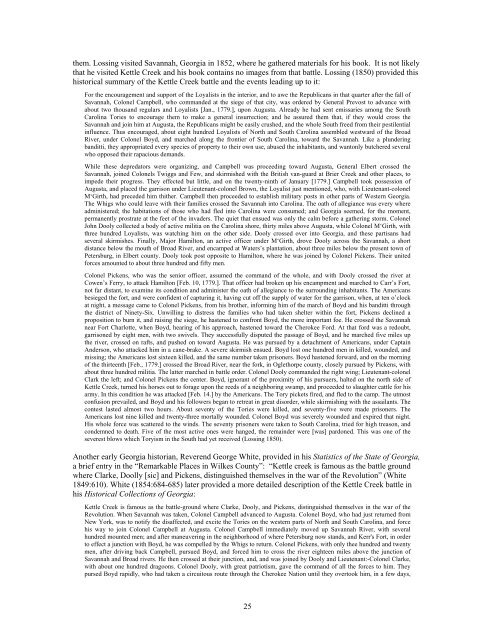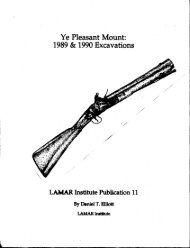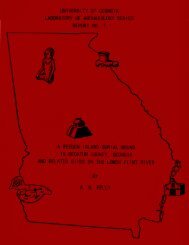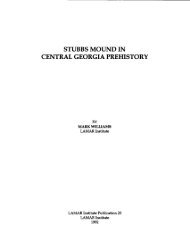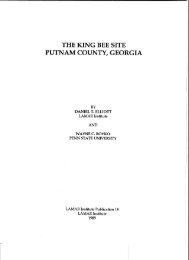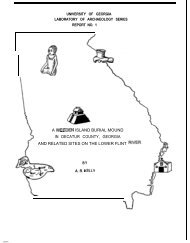Stirring Up a Hornet's Nest: - UGA Laboratory of Archaeology ...
Stirring Up a Hornet's Nest: - UGA Laboratory of Archaeology ...
Stirring Up a Hornet's Nest: - UGA Laboratory of Archaeology ...
Create successful ePaper yourself
Turn your PDF publications into a flip-book with our unique Google optimized e-Paper software.
them. Lossing visited Savannah, Georgia in 1852, where he gathered materials for his book. It is not likely<br />
that he visited Kettle Creek and his book contains no images from that battle. Lossing (1850) provided this<br />
historical summary <strong>of</strong> the Kettle Creek battle and the events leading up to it:<br />
For the encouragement and support <strong>of</strong> the Loyalists in the interior, and to awe the Republicans in that quarter after the fall <strong>of</strong><br />
Savannah, Colonel Campbell, who commanded at the siege <strong>of</strong> that city, was ordered by General Prevost to advance with<br />
about two thousand regulars and Loyalists [Jan., 1779.], upon Augusta. Already he had sent emissaries among the South<br />
Carolina Tories to encourage them to make a general insurrection; and he assured them that, if they would cross the<br />
Savannah and join him at Augusta, the Republicans might be easily crushed, and the whole South freed from their pestilential<br />
influence. Thus encouraged, about eight hundred Loyalists <strong>of</strong> North and South Carolina assembled westward <strong>of</strong> the Broad<br />
River, under Colonel Boyd, and marched along the frontier <strong>of</strong> South Carolina, toward the Savannah. Like a plundering<br />
banditti, they appropriated every species <strong>of</strong> property to their own use, abused the inhabitants, and wantonly butchered several<br />
who opposed their rapacious demands.<br />
While these depredators were organizing, and Campbell was proceeding toward Augusta, General Elbert crossed the<br />
Savannah, joined Colonels Twiggs and Few, and skirmished with the British van-guard at Brier Creek and other places, to<br />
impede their progress. They effected but little, and on the twenty-ninth <strong>of</strong> January [1779.] Campbell took possession <strong>of</strong><br />
Augusta, and placed the garrison under Lieutenant-colonel Brown, the Loyalist just mentioned, who, with Lieutenant-colonel<br />
M‘Girth, had preceded him thither. Campbell then proceeded to establish military posts in other parts <strong>of</strong> Western Georgia.<br />
The Whigs who could leave with their families crossed the Savannah into Carolina. The oath <strong>of</strong> allegiance was every where<br />
administered; the habitations <strong>of</strong> those who had fled into Carolina were consumed; and Georgia seemed, for the moment,<br />
permanently prostrate at the feet <strong>of</strong> the invaders. The quiet that ensued was only the calm before a gathering storm. Colonel<br />
John Dooly collected a body <strong>of</strong> active militia on the Carolina shore, thirty miles above Augusta, while Colonel M‘Girth, with<br />
three hundred Loyalists, was watching him on the other side. Dooly crossed over into Georgia, and these partisans had<br />
several skirmishes. Finally, Major Hamilton, an active <strong>of</strong>ficer under M‘Girth, drove Dooly across the Savannah, a short<br />
distance below the mouth <strong>of</strong> Broad River, and encamped at Waters’s plantation, about three miles below the present town <strong>of</strong><br />
Petersburg, in Elbert county. Dooly took post opposite to Hamilton, where he was joined by Colonel Pickens. Their united<br />
forces amounted to about three hundred and fifty men.<br />
Colonel Pickens, who was the senior <strong>of</strong>ficer, assumed the command <strong>of</strong> the whole, and with Dooly crossed the river at<br />
Cowen’s Ferry, to attack Hamilton [Feb. 10, 1779.]. That <strong>of</strong>ficer had broken up his encampment and marched to Carr’s Fort,<br />
not far distant, to examine its condition and administer the oath <strong>of</strong> allegiance to the surrounding inhabitants. The Americans<br />
besieged the fort, and were confident <strong>of</strong> capturing it, having cut <strong>of</strong>f the supply <strong>of</strong> water for the garrison, when, at ten o’clock<br />
at night, a message came to Colonel Pickens, from his brother, informing him <strong>of</strong> the march <strong>of</strong> Boyd and his banditti through<br />
the district <strong>of</strong> Ninety-Six. Unwilling to distress the families who had taken shelter within the fort, Pickens declined a<br />
proposition to burn it, and raising the siege, he hastened to confront Boyd, the more important foe. He crossed the Savannah<br />
near Fort Charlotte, when Boyd, hearing <strong>of</strong> his approach, hastened toward the Cherokee Ford. At that ford was a redoubt,<br />
garrisoned by eight men, with two swivels. They successfully disputed the passage <strong>of</strong> Boyd, and he marched five miles up<br />
the river, crossed on rafts, and pushed on toward Augusta. He was pursued by a detachment <strong>of</strong> Americans, under Captain<br />
Anderson, who attacked him in a cane-brake. A severe skirmish ensued. Boyd lost one hundred men in killed, wounded, and<br />
missing; the Americans lost sixteen killed, and the same number taken prisoners. Boyd hastened forward, and on the morning<br />
<strong>of</strong> the thirteenth [Feb., 1779.] crossed the Broad River, near the fork, in Oglethorpe county, closely pursued by Pickens, with<br />
about three hundred militia. The latter marched in battle order. Colonel Dooly commanded the right wing; Lieutenant-colonel<br />
Clark the left; and Colonel Pickens the center. Boyd, ignorant <strong>of</strong> the proximity <strong>of</strong> his pursuers, halted on the north side <strong>of</strong><br />
Kettle Creek, turned his horses out to forage upon the reeds <strong>of</strong> a neighboring swamp, and proceeded to slaughter cattle for his<br />
army. In this condition he was attacked [Feb. 14.] by the Americans. The Tory pickets fired, and fled to the camp. The utmost<br />
confusion prevailed, and Boyd and his followers began to retreat in great disorder, while skirmishing with the assailants. The<br />
contest lasted almost two hours. About seventy <strong>of</strong> the Tories were killed, and seventy-five were made prisoners. The<br />
Americans lost nine killed and twenty-three mortally wounded. Colonel Boyd was severely wounded and expired that night.<br />
His whole force was scattered to the winds. The seventy prisoners were taken to South Carolina, tried for high treason, and<br />
condemned to death. Five <strong>of</strong> the most active ones were hanged, the remainder were [was] pardoned. This was one <strong>of</strong> the<br />
severest blows which Toryism in the South had yet received (Lossing 1850).<br />
Another early Georgia historian, Reverend George White, provided in his Statistics <strong>of</strong> the State <strong>of</strong> Georgia,<br />
a brief entry in the “Remarkable Places in Wilkes County”: “Kettle creek is famous as the battle ground<br />
where Clarke, Doolly [sic] and Pickens, distinguished themselves in the war <strong>of</strong> the Revolution” (White<br />
1849:610). White (1854:684-685) later provided a more detailed description <strong>of</strong> the Kettle Creek battle in<br />
his Historical Collections <strong>of</strong> Georgia:<br />
Kettle Creek is famous as the battle-ground where Clarke, Dooly, and Pickens, distinguished themselves in the war <strong>of</strong> the<br />
Revolution. When Savannah was taken, Colonel Campbell advanced to Augusta. Colonel Boyd, who had just returned from<br />
New York, was to notify the disaffected, and excite the Tories on the western parts <strong>of</strong> North and South Carolina, and force<br />
his way to join Colonel Campbell at Augusta. Colonel Campbell immediately moved up Savannah River, with several<br />
hundred mounted men; and after maneuvering in the neighborhood <strong>of</strong> where Petersburg now stands, and Kerr's Fort, in order<br />
to effect a junction with Boyd, he was compelled by the Whigs to return. Colonel Pickens, with only thee hundred and twenty<br />
men, after driving back Campbell, pursued Boyd, and forced him to cross the river eighteen miles above the junction <strong>of</strong><br />
Savannah and Broad rivers. He then crossed at their junction, and, and was joined by Dooly and Lieutenant:-Colonel Clarke,<br />
with about one hundred dragoons. Colonel Dooly, with great patriotism, gave the command <strong>of</strong> all the forces to him. They<br />
pursed Boyd rapidly, who had taken a circuitous route through the Cherokee Nation until they overtook him, in a few days,<br />
25


